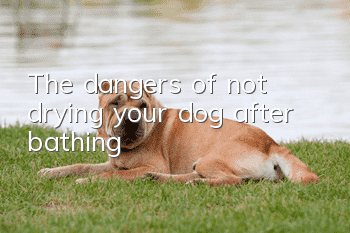Dogs that are poisoned usually die within a few days.

The date of death of a dog after poisoning cannot be determined, because whether the dog dies after poisoning and the speed of death are closely related to factors such as the type of poison, the dose ingested, the strength of the toxicity, and the strength of the body's resistance. If a large amount of strong poisons, such as rat poison, are ingested, death can occur within 2 to 4 hours at the fastest. If the intake is small and treatment is prompt, it may not cause death in your dog.
Emergency measures for dog poisoning:
1. Inducing vomiting and anti-vomiting:
Inducing vomiting is effective in a short period of time after food is eaten. Use emetics. You can take 50 to 100 ml of 1% zinc sulfate solution. If necessary, use apomorphine (apomorphine) 3 mg subcutaneously. When spoiled food has been eaten for more than 4 hours and most of the food has entered the duodenum, emetic drugs cannot be used. Vomiting drugs should be used with caution in pregnant dogs. When vomiting is over, antiemetic drugs, such as diphenhydramine hydrochloride, can be used. The dog can be injected intramuscularly with 0.5~2 mg/kg body weight, and the oral dose is 2~5 mg/kg body weight, twice a day. Diphenamine 1~1.5 mg/kg body weight, intramuscular or subcutaneous injection.
2. Diarrhea and antidiarrheal:
Drhargy is another method to promote the excretion of toxins in the gastrointestinal tract. If you have eaten toxic food for more than 2 to 3 hours and your mental state is still good, you can take laxatives to promote the elimination of toxic food as soon as possible. Be careful not to use vegetable oil when taking purgative measures. When the intestinal contents are basically exhausted, antidiarrheal drugs, such as atropine sulfate, can be used, 0.3 to 1 mg per time for dogs, kilogram of body weight, subcutaneous or intramuscular injection.
3. Antibacterial and anti-inflammatory:
In order to prevent the bacteria in the intestine from continuing to grow and reproduce and produce toxins, broad-spectrum antibiotics, such as gentamicin, chloramphenicol or tetracycline, should be taken orally.
4. Anti-shock:
In order to prevent shock in dogs, corticosteroids can be used, such as intramuscular injection of dexamethasone, 0.25~1 mg each time, or prednisone, Prednisolone and other drugs.
- How to train a golden retriever to defecate in the toilet? Golden retriever toilet training!
- What are the benefits of wearing a muzzle on your dog when going out?
- What should I do if my dog eats the ham wrapper?
- Why does a dog’s belly turn black?
- Causes, symptoms and treatments of dog eczema
- What to look out for when buying a Mastiff puppy
- What causes fungal infections in dogs
- The puppy is too young, how to determine how old the puppy is?
- What's the fastest way to reduce swelling in a dog's leg?
- Determine why a dog is vomiting from its vomit



